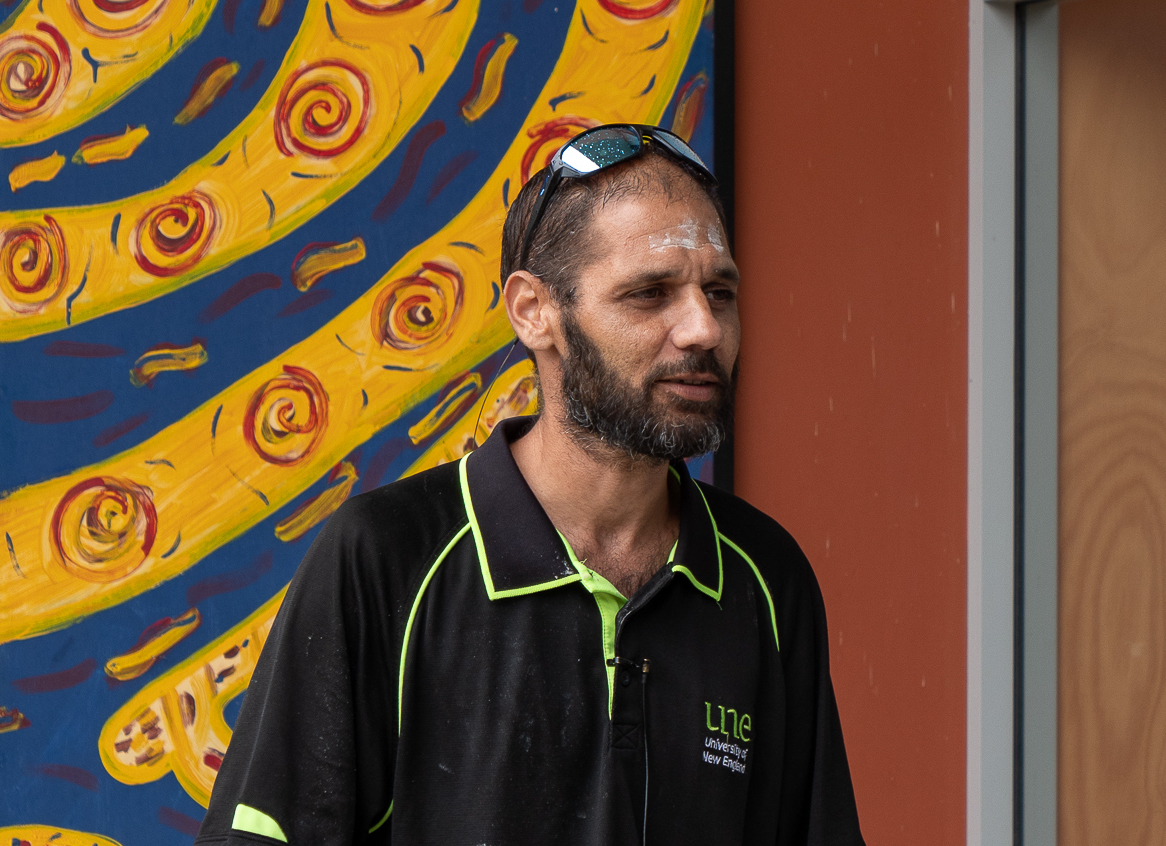
Interview with Steven Ahoy, Aboriginal Cultural Advisor at UNE FMS
Blog content provided by Suzannah Mitchell from Facilities Management Services
I would like to introduce you to my colleague, Steve Ahoy, FMS Aboriginal Cultural Advisor. We have been working together for over a year and we make up UNE’s sustainability team. FMS are responsible for managing the land on which our facilities are built and Steve provides valuable guidance on how to manage the land in a way that is respectful to the Indigenous Culture. I caught up with Steve to talk about his role and discuss a few of the projects we have been working on – as we think it’s really important to share some of these stories with UNE and the wider community and the team from UNE Life have offered to help share a few of our stories, so why not!
Tell us about your role at FMS and some of the projects you are working on at the moment.
The role of the Cultural Heritage Advisor is a relatively new position at the University of New England, that has already proven to be a vital part of the UNE team, regarding Aboriginal Consultation with incorporating Aboriginal Cultural practices and knowledge into areas of the University such as: Education, research and development.
Consultation with the local Anaiwan community about the Cultural Heritage values surrounding the development area of the newly completed UNE Solar Farm has revealed Cultural stories and Artefacts, that will benefit all in the field of Education and research, for both the Aboriginal community and UNE community.
You’re are also a student here at UNE – what are you studying and how has this helped you in your current role?
I started my journey at the University as a student, Archaeology has always been my passion, so naturally, I enrolled in the Oorala centre’s entry program into higher education program TRACKS, upon completing the course I enrolled for a BA majoring in Archaeology. Whilst studying Archaeology I was offered the position of Aboriginal Cultural Heritage Advisor for the FMS and jumped at the opportunity!
This role has led to me reducing my studies as my family, community and work commitment have dramatically increased. But, my work also provides me with training and skills required for my studies, so the job and studies kind of complement each other.
It may take me longer than most to achieve my chosen degree, but I will Graduate as an Archaeologist.
Your family has a strong connection to the land on which UNE is built, can you tell us more about that?
As a local Anaiwan man, whose family has always lived on the land that the University now stands on, I have been told stories of how we lived here traditionally until the arrival of Europeans. My family have maintained a continuing relationship with the White family and later the University of New England, for a generation as stockmen, maids, gardeners, students, academics, advisors and graduates.
There was a few exciting discoveries of artefacts during the solar farm development – can you please share a little about this?
During the development of the UNE Solar Farms Cultural Heritage Survey, a wide variety of lithic artefacts were located such as; bondi points, backed blades, scrapers, flakes and cores. But the most exciting discovery for me was several stone axes made from basalt, that correspond with oral history past down through generation of my family, regarding my great, great grandfather Frank Archibald’s first encounter with Europeans.
Aboriginal culture is amongst the most sustainable cultures in the world. Can you explain to us the importance of land and environment in your culture?
In my heritage, the land, environment and culture are all valued equally and can not be separated. We believe all entities in the universe are connected and support each other. Everything in the universe revolves around life cycles and the cycles of life revolve around evenly and fairly. To put this simply, in this life time, my actions as a human affect the environment and the environment in return affects me as a human. My deceased ancestors are in the Eternal Dreaming Cycle, meaning they are now reincarnated as living animals, trees, plants, sky features and/or land formations.
What advice would you have for people who want to learn more about Aboriginal Culture?
I would suggest for everyone to be honest with your intentions. It’s wise to consult with the Cultural Elders in the local community, this way they will connect you with the appropriate people to help you on your journey, and most importantly try to follow Cultural protocols.
Thanks so much, Suzannah for taking the time to chat with Steve and sharing a bit about the projects you work on together. Thank you, Steve, for offering your time and wisdom to UNE and for this interview.
Sustainability on campus is something we all play a role in.
Learn more about what happens at our Armidale Campus today.


